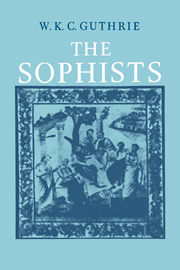Book contents
- Frontmatter
- Contents
- List of Abbreviations
- Preface
- I INTRODUCTION
- II TOPICS OF THE DAY
- III WHAT IS A SOPHIST?
- IV THE ‘NOMOS’ – ‘PHYSIS’ ANTITHESIS IN MORALS AND POLITICS
- V THE SOCIAL COMPACT
- VI EQUALITY
- VII THE RELATIVITY OF VALUES AND ITS EFFECTS ON ETHICAL THEORY
- VIII RHETORIC AND PHILOSOPHY (Seeming and being, believing and knowing, persuading and proving)
- IX RATIONALIST THEORIES OF RELIGION: AGNOSTICISM AND ATHEISM
- X CAN VIRTUE BE TAUGHT?
- XI THE MEN
- Bibliography
- Index of passages quoted or referred to
- General Index
- Index of selected Greek words
- Frontmatter
- Contents
- List of Abbreviations
- Preface
- I INTRODUCTION
- II TOPICS OF THE DAY
- III WHAT IS A SOPHIST?
- IV THE ‘NOMOS’ – ‘PHYSIS’ ANTITHESIS IN MORALS AND POLITICS
- V THE SOCIAL COMPACT
- VI EQUALITY
- VII THE RELATIVITY OF VALUES AND ITS EFFECTS ON ETHICAL THEORY
- VIII RHETORIC AND PHILOSOPHY (Seeming and being, believing and knowing, persuading and proving)
- IX RATIONALIST THEORIES OF RELIGION: AGNOSTICISM AND ATHEISM
- X CAN VIRTUE BE TAUGHT?
- XI THE MEN
- Bibliography
- Index of passages quoted or referred to
- General Index
- Index of selected Greek words
Summary
POLITICAL EQUALITY
In the fifth century democracy, both as an established political constitution and as an ideal, reached its climax in Athens and some other Greek cities. Against it stood oligarchy, by no means a spent force, and whether in power or in opposition always a foe to be reckoned with. Naturally therefore an ideological conflict developed which led men on beyond constitutional questions to larger problems of human nature and human relations. Democracy was part of a general movement towards equality, and the need to defend democracy was a spurto further arguments in its favour. Thucydides provides some of the best examples of this, for instance in the speech of Athenagoras, democratic leader of Syracuse, who says to the young oligarchs of his city (6.38.5):
Do you dislike being politically on an equality with a large number? But how is it just for members of the same state to be denied the same rights? I shall be told that democracy is neither sensible nor fair [literally ‘equal’], and that the wealthy are also the best fitted to rule; but I reply, first, that demos means the whole state, oligarchy only a part; secondly, that the wealthy may be the best guardians of property, but the best counsellors are the intelligent, and the best at listening to and judging arguments are the many. And in a democracy all these, whether acting separately or together, have an equal share.
Here we have the ideal of a democracy, in which the rich have their place, but it is for the most intelligent to give counsel—possibly conflicting counsel, for there are two sides to every question—and the decision is in the hands of the whole people, when they have listened to the arguments and sized them up. In practice it did not always work out like that, for demos no less than oligoi could be applied to a section only of the population—could mean plebs as well as populus — and as such could be ruthless in its treatment of the rich or intellectual.
- Type
- Chapter
- Information
- A History of Greek Philosophy , pp. 148 - 163Publisher: Cambridge University PressPrint publication year: 1977

